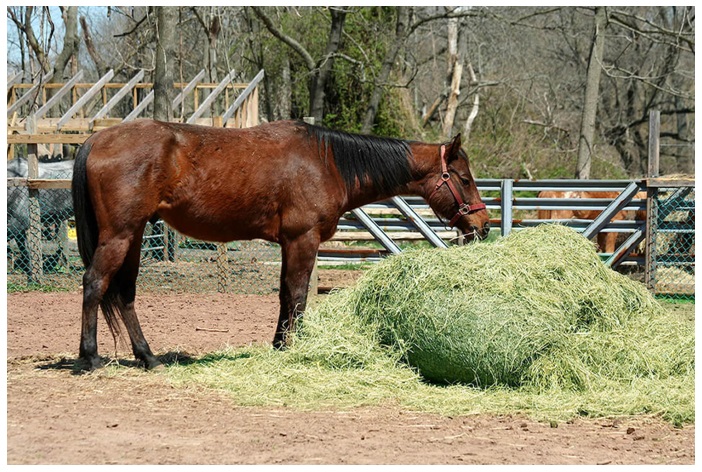In the quest for optimal equine health, horse owners often find themselves navigating a heap of dietary options to address specific concerns. One prevalent issue that is cause for concern is gastric ulcers, a condition that can significantly impact a horse’s well-being and performance. While various management strategies exist, one often-overlooked solution lies in the nutritional powerhouse known as alfalfa.
Digestive Support
Alfalfa, scientifically known as Medicago sativa, is a leguminous plant renowned for its rich nutrient profile. One attribute that sets alfalfa apart is its ability to provide excellent digestive support for horses. The high fibre content in alfalfa promotes healthy gut function. Additionally, alfalfa is high in calcium which is beneficial in buffering stomach acid, potentially reducing the risk of gastric ulcers in horses.
Adding chopped alfalfa to the horse’s bucket feed can help to increase chew time and promote increased saliva production. Saliva contains bicarbonate which acts as a natural antacid, helping to neutralise stomach acid and create a more hospitable environment in the digestive system. This dual action of fibre and saliva production can contribute significantly to preventing and managing gastric ulcers in horses, making alfalfa an attractive addition to their diets.
Alfalfa’s Nutrient Profile
Beyond its digestive benefits, alfalfa boasts a rich nutrient profile. This legume is an excellent source of high-quality protein, essential amino acids, and a range of vitamins and minerals. These nutrients play a vital role in supporting overall well-being and may contribute to a healthier gastrointestinal system.
Alfalfa’s high calcium content is particularly noteworthy, as calcium has been associated with buffering stomach acid. The elevated level of calcium in alfalfa is also advantageous for bone health, promoting skeletal strength and resilience.
Alfalfa also contains essential vitamins such as vitamin A, vitamin E, and a variety of B vitamins, each contributing to the horse’s immune function, muscle development, and energy metabolism. By incorporating alfalfa into a horse’s diet, owners can provide a comprehensive array of nutrients to support overall health.
Feeding Horses Alfalfa
While alfalfa offers numerous benefits, horse owners need to approach its inclusion in the diet with careful consideration. The rich nutrient content can be beneficial, but it should not be used as the sole forage source. Balancing alfalfa with other forages and a balancer based on the individual horse’s needs, workload, and health status is crucial.
Soaking alfalfa cubes or pellets before feeding can be a useful practice, especially for horses prone to choke or those with dental issues. This process helps break down the pellets, making them easier to chew and reducing the risk of impaction.
Consulting with an equine nutritionist can provide valuable insights into tailoring a diet that best suits the specific needs of each horse.
Alfalfa’s Support for Senior Horses
As horses age, their nutritional requirements may change. Alfalfa is a precious ally in supporting the unique challenges faced by senior horses because the nutrient density of alfalfa provides a concentrated source of easily digestible nutrients, making it an ideal addition to the diets of ageing equines.
Alfalfa also has a high-quality protein content. Protein is essential for supporting muscle mass, and senior horses often experience muscle wasting or loss due to ageing. Incorporating alfalfa into the diets of older horses as part of a nutritionally balanced ration is a useful way to supply good quality protein, which may help mitigate some of this muscle loss, supporting senior horses in maintaining strength and mobility as they navigate the challenges of ageing.
Additionally, the fibre content in alfalfa plays a crucial role in supporting gastrointestinal health for senior horses. The fibrous nature of alfalfa encourages prolonged chewing, promoting saliva production and helping to support acid buffering in the stomach. Providing plenty of fibre also helps to reduce the risk of issues such as colic and impaction. Older equines may encounter dental issues or have difficulty chewing, in which case using soaked alfalfa pellets may be a preferable option to continue to provide alfalfa in their rations.
By understanding the unique advantages alfalfa offers, horse owners can make informed decisions to promote the well-being and performance of their equine companions.



